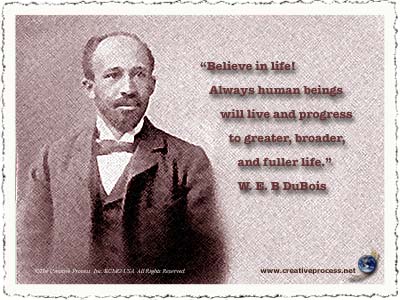First Pan-African Congress in Paris

...on this day in 1919, W.E.B. Dubois organized the first Pan-African Congress, held in Paris, France.
Racist treatment reinforced a sense of solidarity within the Diaspora. This found expression in a series of Pan-African meetings. In 1909 the first Pan African Conference was held. In 1919 the first of five Pan-African Congresses was held. This was organised by the African American thinker and journalist, W.E.B. DuBois. Fifty seven delegates attended representing fifteen countries. Its principal task was petitioning the Versailles Peace Conference, then meeting in Paris. Among its demands were:a) The Allies administer the former German territories in Africa as a condominium on behalf of the Africans who lived there.b) Africans should take part in governing their countries "as fast as their development permits" until, at some unspecified time in the future, Africa is granted home rule.
...more on the pan-Africanism, by Dr. John Henrik Clarke...:
Early in this century, Caribbean intellectuals began to produce the concept called Pan-Africanism. This was a new international education whose full dimension few of us understood. The idea of bringing the totality of the African world together as one people, looking at the very essence and existence of African people. The first Pan-African Congress was called in London by H. Sylvester Williams in 1900. W.E.B. DuBois, who would later be referred to as "the Father of Pan-Africanism," was really the intellectual guardian of Pan-Africanism and its finest scholar. In my opinion, the first Pan-African Congress, 1900, and the fifth Pan-African Congress in Manchester, England, 1945, were the most significant. The basic ideas that went into the African independence explosion came out of the fifth Pan-African Congress convened by George Padmore, Kwame Nkrumah, and other Africans, some of whom would become future heads of state.
Again, in my opinion, what could have been the most important PanAfrican Congress and the first to meet on African soil was the Sixth Pan-African Congress. It was the largest and most diverse of these meetings. It was unwieldy and very little was accomplished. Too many Africans from different parts of the world and from within Africa itself came with different agendas. Not much was achieved except some good and bad conversations and an unfortunate fight over ideologies. There should have been a preparatory meeting in order to clarify the terms of the Sixth Pan-African Congress. The sixth Pan-African Congress that met in Tanzania, in my opinion, was a great opporninity misunderstood and killed by selfish, petty, amateur political hacks who had no clear idea of what the concept of African unity could be.
All "Pan" efforts among African people must ultimately lead to a concept of a world union of African people, in spite of geography, religion, and culture. African people live in many lands, under many regimes and practice many religions and represent many cultures. Wherever they are on the face of this earth they must think of themselves as first and foremost an African people, no less patriotic to the nations where they live outside of Africa.
The acceptance of the African American history and the African American historian as a legitimate part of the academic community did not come easily. Slavery ended and left its false images of black people intact. In his article, "What the Historian Owes the Negro," the noted African American historian, Dr. Benjamin Quarles, says:
The Founding Fathers, revered by historians for over a century and a half, did not conceive of the Negro as part of the body politic. Theoretically, these men found it hard to imagine a society where Negroes were of equal status to whites. Thomas Jefferson, third President of the United States, who was far more liberal than the run of his contemporaries, was never the less certain that "the two races, equally free, cannot live in the same government."
The role and importance of ethnic history is in how well it teaches a people to use their own talents, take pride in their own history and love their own memories. In order to fulfill themselves completely, in all of the honorable endeavors it is important that the teacher of history of the black race find a definition of the subject, and a frame of reference that can be understood by students who have no prior knowledge of the subject.
The following definition is paraphrased from a speech entitled, "The Negro Writer and His Relation To His Roots," by Saunders Redding, in 1960:
Heritage, in essence, is how a people have used their talent to create a history that gives them memories that they can respect, and use to command the respect of other people. The ultimate purpose of history and history teaching is to use a people's talent to develop an awareness and a pride in themselves so that they can create better instruments for living together with other people. This sense of identity is the stimulation for all of a people's honest and creative efforts. A people's relationship to their heritage is the same as the relationship of a child to its mother.
I repeat:
History is a clock that people use to tell their time of day. It is a compass that they use to find themselves on the map of human geography. It also tells them where they are, and what they are. Most importantly, an understanding of history tells a people where they still must go, and what they still must be.
Rational For Pan-Africanism
Labels: John H. Clarke, Pan-Africanism, W.E.B. Dubois




1 Comments:
This blog is very informative, I would like to talk to you about your resources and the possibly of a position as a researcher. Pleas contact me if you are still out there.
Nadia
articulateperson@gmail.com
Post a Comment
Subscribe to Post Comments [Atom]
<< Home